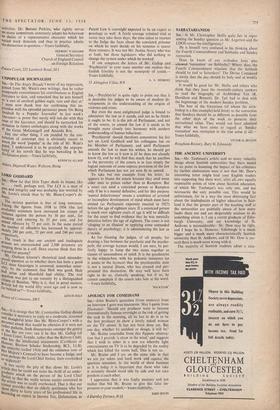SIR,—'Psychiatrist' is quite right to point out that it is
desirable for judges to be aware of modern de- velopments in the understanding of the origins of violence and crime.
But even the most enlightened judge is bound to administer the law as it stands, and not as he thinks it ought to be. It is the job of Parliament, and not of the courts, to amend the law if it needs to be brought more closely into harmony with modern understanding of human behaviour.
'Psychiatrist' should therefore concentrate his fire not on Lord Goddard and his colleagues but on his Member of Parliament; and until Parliament amends the law to meet his wishes, he should get to know the law as it now is (if he does not already know it), and he will find that much that he ascribes to the perversity of the courts is in fact simply the' logical outcome of some express provision of the law which Parliament has not yet seen fit to amend.
To take but. one example from his letter, he appears to blame the courts because they send some older' men to prison rather than to Rampton. But a court can send a convicted person to Rampton only if he is a mental defective; and for this purpose 'mental defectiveness' means a condition of arrested or incomplete development of mind which must have existed (as Parliament expressly enacted in' 1927) before the age of eighteen years. If a convicted person is much over eighteen years of age it will be difficult for the court to find evidence that he was mentally defective before the age of eighteen. The court is not 'clinging to an illusion' or applying some outmoded theory of psychology; it is administering the law as it stands.
As for blaming the judges, of all people, for drawing a line between the psychotic and the psycho- path, the average layman would, I am sure, be per- fectly happy to lump the two states together as classes of unsoundness of mind. It is the psychiatrist in the witness-box, with his pedantic insistence (as it seems to the layman) that the psychopathic state is not a mental illness, who has created and per- petuated this distinction. He may well have been right to do so, clinically speaking; but if so, he cannot complain if the courts take him at his word.
—Yours faithfully, 'SOLICITOR'


































 Previous page
Previous page